#to provoke action; quite a character reversal for the two‚ all the more clear for mirroring so closely their opposite views in the prev one
Explore tagged Tumblr posts
Text
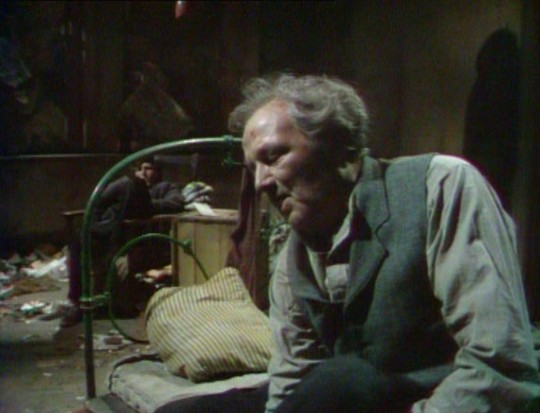
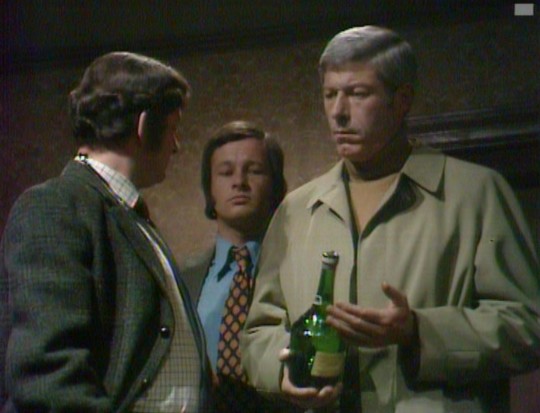
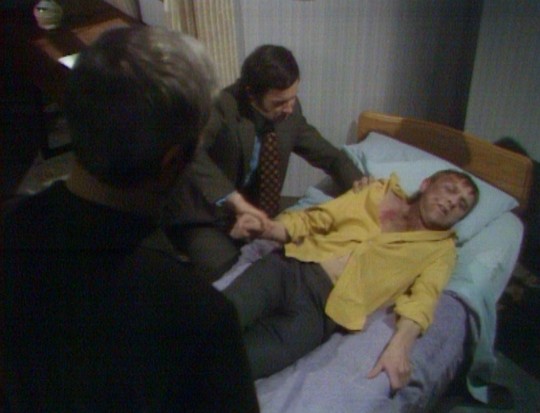
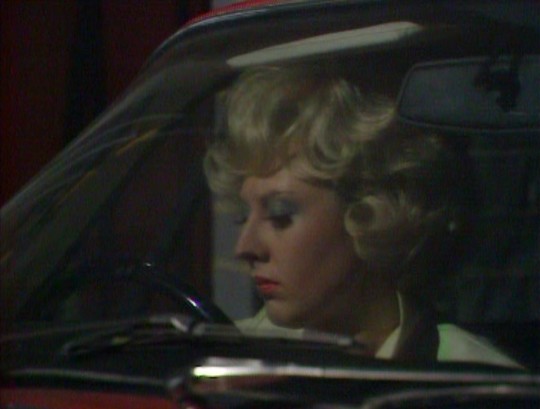
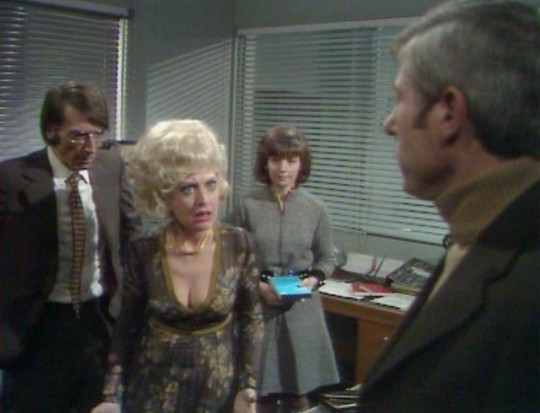
New Scotland Yard: Shadow of a Deadbeat (2.6, LWT, 1972)
"Anything wrong?"
"Anything wrong? She knows how to contact Eddie Moffett, you can bet your life on it!"
"I'm betting Lee Collins' life on it."
"She's gonna go to the nearest phone and she's gonna tell Eddie just where Collins is."
"That's right."
"It's too dangerous."
"Oh, it's been dangerous ever since Moffett pulled that trigger!"
#new scotland yard#shadow of a deadbeat#lwt#1972#don houghton#bryan izzard#john woodvine#john carlisle#richard mathews#john rees#alex marshall#paul grist#david webb#gil sutherland#john graham#kenneth gilbert#eric allan#terence mountain#barbara grant#gangsters again! and another set of new subordinates to be slightly uncomfortable around Kingdom's Big Police Chief. actually this feels#very connected to the prev ep in a number of ways; Kingdom takes risks in developing this case which are quite similar the risks Ward took#in the last one (and which blew up in his face and for which he was roundly told off); of course it all works out fine for our hero..#the case is one of a murdered vagrant‚ mistaken for a gangland bigwig. thus the script splits fairly neatly between covering the#mob plot stuff whilst also doing a little half hearted soul searching about alcohol abuse and homelessness among#those on the margins of society. it's weakly handled compared to some of the other social issue stuff the series has tried its hand at and#it has a strangely pointless downbeat ending (there's no real reason for that side of the plot to end so hopelessly and sadly)#i will say it makes a change to have Ward acting carefully and showing disapproval of Kingdom's ethically dubious attempts#to provoke action; quite a character reversal for the two‚ all the more clear for mirroring so closely their opposite views in the prev one#no big draws in the guest cast but i did enjoy kenneth gilbert's weary forensics guy. oh and there's a WDC but it isn't Pauline Stroud#ig she's gone the way of other minor recurring faces from s1 (including Kingdom's journalist brother in law) and disappeared into the ether
4 notes
·
View notes
Text
Foundation 1x01 The Emperor’s Peace: My Thoughts

Intriguing. Overall it was pretty generic and uninspired, basically slapping some basic sci-fi stuff together, but there were moments and things here and there that I enjoyed, even loved. Primarily, I was unreasonably excited upon hearing characters mention the worlds and peoples of Issac Asimov’s world! It is just so thrilling to finally have the first real manifestation of his work! Anacreonians, Terminus, Trantor - I am just happy that Asimov’s creation is being brought to mainstream audiences! This is original science fiction right here, folks - from the golden age of science fiction! It is just glorious that we are even getting anything.
My overall assessment, though, of my first impression is that I give the creators and writers props for earnest intentions. I could sense, at least from this first episode, their desire to stay true to the source material. Unfortunately, they just don’t quite have the skill to pull it off. Namely, they are wanting to tell Foundation in the style of Game of Thrones. It is a horizontal style of storytelling, which if you have someone as genius as George R.R. Martin is, then this would be a brilliant way of telling the story so that audiences can relate to what is going on. Yet, the writers are not GRRM, and so it falls kind of flat. And the problem with this approach is that Asimov’s trilogy was told vertically, a bird’s eye view of history and its many players. Naturally, this is difficult to faithfully adapt - hence why it took a decade or so to get this up and running. You can’t really tell a series like that, but in order to adapt the original model into this new model means you would have to understand fully the complex interworkings of politics, socio-politics, psychology, and more. You would have to create a distinct and compelling world both visually and thematically. Asimov only ever did world-building that was necessary to his purposes, which was very limited and generalized, so there isn’t a lot of help from the source material. Again, you would have to become a George R.R. Martin to pull that off.

I actually really loved this idea of the epic mural in the Empire! It was so beautiful and powerful, perfectly exemplifying the image the Empire is wanting to project. (Lee Pace in royal space pajamas is a plus!)

This ONE image called to my mind my own imaginings while I was reading Asimov's stories. It is the atmosphere, the murky shadows of Trantor in the distance and the only sprawling oasis within a dense city. Trantor was the original Coruscant. I hope the show explores Trantor more, as it is pretty cray in the deepest depths.
The main problem, though, is that I do not believe they understood exactly what made Asimov’s novels exemplary, the true spirt of them. It was disappointing to have Asimov’s ideas, which are so enthralling and compelling that you couldn’t put his books down, become muddled and kind of haphazardly expressed through various moments. Obviously the high points are when Hari Seldon is speaking. He steers the ship back to its center a bit, and of course Jared Harris is brilliant. He was THE PERFECT casting choice, and I am so happy to have him.
One of the reasons for this is that Asimov’s books, on top of their vertical model of storytelling, are also told primarily through dialogue - characters having conversations in rooms. There are moments of narrative, but the story IS dialogue. That’s it. Asimov usually told many of his stories in this format, of characters expressing ideas and concepts in a kind of back-and-forth interplay and strategic gameplay. I could see them trying to mimic this in the show, but they are totally missing the whole point and purpose of what Asimov was building. It is clear they just don’t understand fully his concepts. They get it on a surface level, but not the depth.
“Action and romance have little to do with the success of the Trilogy - virtually all action takes place offstage, and the romance is almost invisible - but the stories provide a detective-story fascination with permutations and reversal of ideas.” - This was said by science fiction writer and critic James Gunn (weirdly enough) back in Asimov’s day. This is it. That is Foundation. The series explores ideas like free will, social decay and stagnation, psychology, human frailties, human ingenuity, the role of science in and upon human history, and more, but it explores them through opposition and plays them out like a chess game - permutating throughout a whole galactic history. The end results are stunning - chilling - but are meant to provoke thought and discourse. I have never written out my own thoughts and opinions of what Asimov’s Foundation novels can tell us, but it is truly compelling and fascinating. This is what the show is missing, and will probably never achieve. Alas! I guess I will just take what I can get.


These two actors keep the story and screen engaging. They are so good! Oh, and I now understand why they changed the Emperial government structure. I was weirded out by them being Brother Dawn, Brother Day, and Brother Dusk and them being clones of the original Emperor Cleon - but I see now that this was their attempt at expressing the stagnation of the Empire and how far it has fallen, decaying from within. I guess I am okay with that, but again, just kind of lackluster in how it was expressed. Lee Pace is beautiful, though. Gotta give them that much!


I absolutely LOVE the opening credits! They are so pretty and spacey with epic and weird statues!
9 notes
·
View notes
Text
Forgiving Sirhan Sirhan
Sometimes life imitates art (and sometimes just the reverse), but what is true about art is true about religion as well: there are times when specific issues are on our minds owing to the nearness of a holiday or some imminent life cycle moment…and then, just as we are focused on that specific issue, it appears on the front page of the paper in some wholly other context and invites us to consider its intricacies from an entirely different angle.
As we count down the days to Rosh Hashanah, the question of forgiveness is on our minds…and in a dozen different ways. If we have wronged someone in the course of the year now ending, can we ask for forgiveness in a way that provokes a charitable response on the part of the ill-treated party? If we have behaved poorly (even in a way known solely to ourselves), can we repent us of our sin sufficiently meaningfully and wholeheartedly for us not to be judged harshly during the course of these coming Days of Judgment? If we have remained silent and inert while seeing another soul being wronged or demeaned, or treated unjustly—or even while merely knowing that someone was being treated in one of those ways, can we forgive ourselves to the extent necessary to stand up in shul and recite our Rosh Hashanah prayers without feeling like hypocrites? Owning up to our own weaknesses of character and errors of judgment is, after all, not quite as easy as it sounds in that it requires a level of self-awareness and candor that comes naturally to almost none of us. So to do it at all is difficult. But to do it because we truly regret our errors of judgment and moral missteps and not merely because we hope merely to garner for ourselves a good write-up in God’s great Book of Life—that is neither a simple nor a straightforward path for any of us to follow.
So those were the ideas that have been occupying me in these last weeks as we move ever closer to the Days of Awe. And then I opened the paper the other day and who should be looking out at me if not Sirhan Sirhan, the man convicted of murdering Robert F. Kennedy in 1968 and sentenced the following year to be executed for his crime. (In 1972, when the California Supreme Court determined that capital punishment was in violation of the state constitution’s stricture against cruel or unusual punishment, his sentence was retroactively commuted to life in prison.) The years passed. As generally happens with the incarcerated, the public heard almost nothing about him. From time to time, a brief note would appear in the paper reporting that Sirhan had yet again been denied parole. But then, just one week ago, Sirhan appeared for a sixteenth time before the parole board and this time he was recommended for parole.
Their recommendation, it turns out, does not guarantee his release. First, there will be a ninety-day review by the California Board of Parole Hearings. And then Governor Gavin Newsom will have thirty days to accept the parole board’s recommendation or to alter it or to reject it. The governor, who has his own hands full with a serious effort to remove him from office, has not indicated how he will respond. Sirhan Sirhan was twenty-four years old at the time of RFK’s assassination and is now seventy-seven.
I remember Robert Kennedy’s assassination vividly. I was just wrapping up tenth grade when he was killed on June 5, 1968. And I was a huge fan, one of my only classmates to prefer his candidacy for the Democratic nomination for president to Eugene McCarthy’s. He had his flaws, to be sure. But he had been a presence in American life since the John Kennedy presidency, during the course of which he served not only as his brother’s Attorney General, but also as his closest advisor. As a result, his willingness to run for president represented—to many of us, at least, including to myself and my parents—the possibility of returning to Camelot, of restoring some version of the John Kennedy presidency to our riven country just five years after Dallas.
And then, in a heartbeat, it was over. The images are, at least for people my age, indelible. RFK lying on the floor of that hotel kitchen. The busboy putting a rosary in Kennedy’s hands while he was still conscious. The funeral service at St. Patrick’s. Andy Williams singing The Battle Hymn of the Republic. The nighttime burial in Arlington. John Glenn presenting the flag to Ted Kennedy, then the latter handing it to his mother.
The assassin, a Palestinian without American citizenship, was motivated to murder Kennedy because of the latter’s support for Israel. So that’s certainly part of the story—in general as well, but for me personally in an intense, meaningful way.
And now the newspaper meets the Machzor and challenges me, not to decide what the man’s fate should be (that will ultimately fall to the governor of California, Newsom or whomever), but answer a series of simple questions prompted by the parole board’s decision. Is forgiveness a gift that must be freely offered or can it be earned? If the former, can it be offered other than by the wronged party? (That is obviously an impossibility if the wronged party is dead.) Society can free RFK’s murderer…but would that be tantamount to forgiving the man? The man has been in jail for fifty-three years. He claims to have been drunk when he murdered RFK, a man he had never met and did not know personally. He admits his guilt, but only because he feels it was proven in court, not because he has any recollections at all of the actual event. He is clearly a danger to no one at all at this point. And so the parole board felt that he had earned the right to live free for whatever time he has left. They clearly have the right to free (or to start that ball rolling). But can they forgive?
The responses to the parole board’s decision have been fast and furious. Six of Robert Kennedy’s children expressed outrage that their father’s murdered could possibly be allowed to get on with his life, while their father remains dead and thus unable to get on with his. (To see Maxwell Taylor Kennedy’s op-ed piece opposing parole from the Los Angeles Times, click here. To read Rory Kennedy’s piece published yesterday in the New York Times, click here.) But two of RFK’s sons, Douglas Kennedy and Robert F. Kennedy Jr., support the board’s decision, the latter going so far as to say that he was grateful to have lived to see the day on which his father’s murdered could be deemed “worthy of compassion and love.” Clearly, they forgive their father’s murderer. But do they have that right? That’s the question the whole story has challenged me to ponder.
That Sirhan Sirhan is a different man at seventy-seven than he was at twenty-four is hardly an impressive achievement: of what seventy-seven year old could not the same thing be said? But the question here is neither whether he is a new man or whether he regrets his actions. Nor is the question for me personally to consider whether the man will or will not constitute a danger to society if he is freed. (Those are obviously huge questions for the parole board to work through. But I don’t sit on that board—and I’m asking a different question here, one related to the question of forgiveness, not to the actual decision regarding Sirhan Sirhan’s release from prison.) Our tradition is clear that bad deeds fall into three categories: those which can be forgiven by the wronged party (whom the doer of the deed must find the courage to approach and ask for forgiveness), those which cannot be forgiven by the wronged party because the latter is dead (in which case tradition suggests convening a minyan at the grave of that individual, publicly confessing to the wrongdoing, and praying for God’s mercy), and those which cannot be forgiven because the aggressed-against party is not known (in which case all the doer of the deed can do is to fast, confess the wrongdoing, and pray for forgiveness). There are a thousand subcategories to those categories, but all are rooted in the same simple concept that only the wronged individual can forgive the wrongdoer. The rest of us can be understanding, generous, kind, and non-judgmental. But if you wish forgiveness, tradition instructs you to find the courage to address the wronged party and to ask—simply and unequivocally—for that individual’s forgiveness. Nothing more than that. But also nothing less.
0 notes